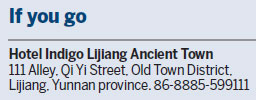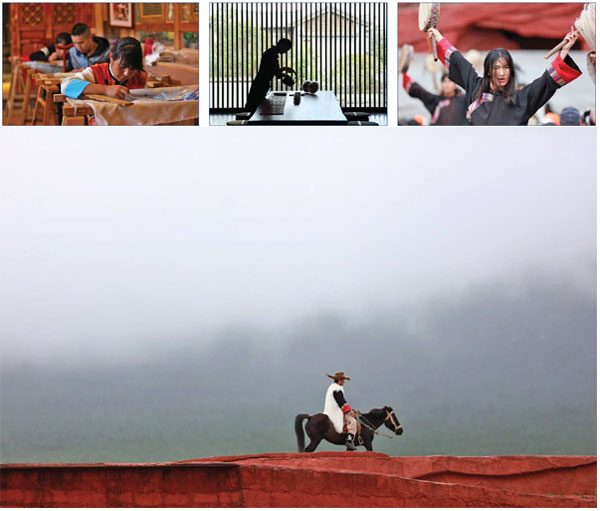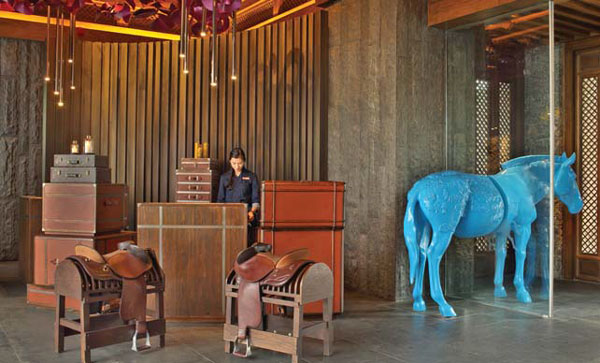In search of the Ancient Tea Horse Road
Updated: 2016-11-04 07:25
By Ren Qi(China Daily Europe)
|
|||||||||
Tourists visit Lijiang to find the legendary Tea Horse Road, to enjoy scenery or to search for inner peace
Lijiang has been famous all over China as a key town along the ancient Tea Horse Road in Yunnan province since the 6th century. Now it's a major travel destination.
Shuhe Old Town, occupying an area of 3.8 square kilometers, was first built in the late Song Dynasty (960-1279) and the early Yuan Dynasty (1271-1368). It's a favorite of tourists from China and abroad and is listed as a UNESCO Heritage Site as well as the beginning of the ancient Tea Horse Road.
Tourists visit Lijiang for various reasons - to find the legendary Tea Horse Road, for natural scenery or simply to search for inner peace in the Old Town at the foot of the hill. But no one can resist the beauty of Lijiang, whose name literally means "beautiful river" in Mandarin.
|
Clockwise from left: Nowadays increasing numbers of Naxi residents want to learn traditional embroidery and sewing skills. A tea ceremony at Hotel Indigo Lijiang Ancient Town. A live show is performed three times daily at Jade Dragon Snow Mountain, depicting the lives and loves of the Naxi people. The ancient Tea Horse Road is an everlasting theme in Lijiang. |
The Hotel of Indigo Lijiang might be the perfect place to start the journey.
Located at the front entrance of Shuhe Old Town, Hotel Indigo Lijiang Ancient Town is convenient for those who want to spend a day or two walking around.
And if you are lucky enough to book a second-floor room facing north, you will have a clear view of the entire town.
Of course, when you enjoy the old buildings and the scenery from your window, you can open a fine French wine from the mini bar in your room. Can't find the mini bar? Actually it is inside an old Tea Horse Road-style leather suitcase, and so is the digital safe.
In the presidential room, Tea Horse Road decor is raised to a higher level: The living room is a gallery for art masterpieces. In the cupboard you can find some vivid Tea Horse Road goods. In the bedroom, there's a map of the ancient road on the wall.
Ernst Mayer, the general manager of InterContinental Lijiang ancient Town Resort and Hotel Indigo Lijiang Ancient Town, says China's travel modes are changing a lot, and more tourists prefer staying in a hotel with many local Lijiang decorations.
Mayer points to a corner of an underground meeting room in the hotel - there are some chairs, artworks and books about Lijiang traditional culture - saying this is one of the favorite corners in his hotel, and tourists spend hours here, reading and feeling the inner peace of Lijiang.
Mayer says one of the reasons that Lijiang attracts tourists is its close connection with the Tea Horse Road, a trade link from Yunnan that was active a thousand years ago. And so he decided to include related elements in the decor of the hotels. It was a good decision, he says.
Despite some old collections, all rooms still look cool, equipped with all kinds of high-tech electrical appliances, including a Nespresso machine, bluetooth stereo and an iPad, on which you can surf the internet, check the instructions of the hotel, look for shops or book your dinner.
People always say quiet and noisy are the two main impressions of visitors to Shuhe Old Town.
When the sun sets and night comes, all the quiet elements suddenly disappear and the town is filled with crowds and sound.
The street along both riverbanks in the town is nicknamed Bar Street, as it assembles a line of live music, dance, pubs and revelry.
Even in the tourist off-season, Bar Street is filled with loud electric music, live concerts, tourists and residents from neighboring towns.
Like a maze, the winding cobblestone streets of Shuhe provide a quiet place in the daytime, especially when it's not a national holiday, a time the streets do get crowded.
Still, it is extremely easy to get lost, as there is no grid in the district. The town's layout was designed to conform to the flow of three streams and feng shui, the art of harmony.
But each turn in the town takes one to a new interesting spot.
If you do want to get up late and have a lazy lunch, you can book traditional Naxi Copper Hotpot from the front desk at Hotel Indigo to enjoy Tea Horse cuisine.

Indigo provides two different flavors of hotpot. One is chicken and the other is cured pork ribs. Both are cooked in a copper pot.
Mayer says there are many stories about the local copper hotpot, and all share a common theme: Hotpot was offered by Naxi to all the most important guests.
According to Mayer, the pot was carried by the merchants along the Tea Horse Road, because it served not only as a cooking utensil but as currency that could be traded as needed.
renqi@chinadaily.com.cn
|
Hotel Indigo Lijiang Ancient Town is located at the front entrance of Shuhe Old Town. Photos by Ren qi / China Daily |
(China Daily European Weekly 11/04/2016 page22)
Today's Top News
Li promotes SCO bank, free trade
High Court: Parliament must vote before Brexit
Court to instruct how to trigger formal EU exit
Premier emphasizes fight against terror
Italian authorities vow to rebuild earthquake-hit areas
Li arrives in Kyrgyzstan for visit, SCO meeting
Xi affirms one-China policy
France to begin moving migrant minors from Calais
Hot Topics
Lunar probe , China growth forecasts, Emission rules get tougher, China seen through 'colored lens', International board,
Editor's Picks

|

|

|

|

|

|









